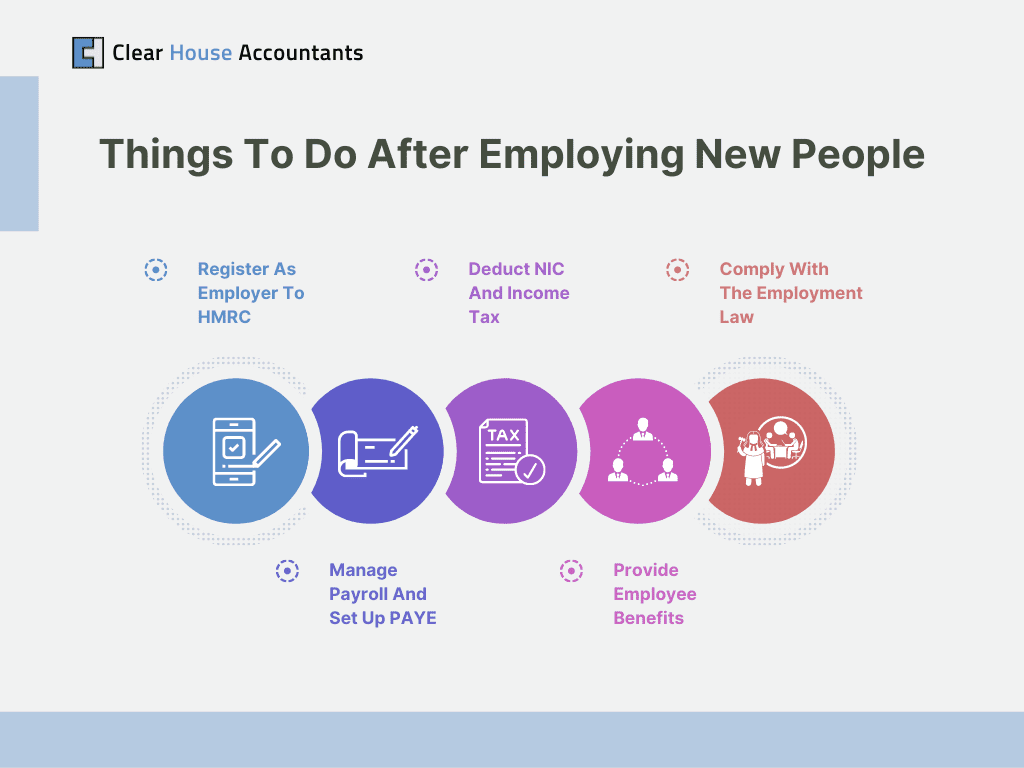Simply, the term ‘sole trader’ is applied to any person who does not have a separate legal structure for conducting the business, such as a Partnership or a Limited company.
Sole traders often have employees working for them, either freelancers or employees. Furthermore, being a sole trader means you can run your business by yourself and that you’re trading under your name, does not mean you should always work alone.
This article will lay out how sole traders can register with HMRC as an employer, the steps involved in this registration and what information you need to provide to HMRC if you want to register as an employer.
Can A Sole Trader Be An Employer?
The good thing is that you can hire people and remain an accountant for a sole trader at the same time. You need to complete some basic steps to set yourself up as an employer. These steps are almost the same as those of limited companies.
- The first step is to register with HMRC (HM Revenue and Customs).
- PAYE registration should generally occur before the first payment of salary, but not more than two months before the first payment.
- Being an employer, usually, you have to operate PAYE as part of your payroll. After getting registered with it, every employer gets a PAYE reference number from HMRC for their business. It is a particular combination of numbers and letters that HMRC uses to identify your business.
Documents Required for a Sole Trader Employer With HM Revenue and Customs (HMRC)
It requires some of your business-related information to start registering you as an employer. That includes:
- Company Name
- The company’s email address
- Company’s UTR (unique taxpayer reference)
- Business Address
- The date when the first payment will be given to the employees
- Total number of employees, including directors of the company
- Expenses and other Benefits (If any) are provided to the employees.
- Name of the company’s Director
- National Insurance number of the company’s Director
Once you have this information ready to provide to HMRC, you can register as an employer.
Being An Employer With HMRC In Various Ways
You can log in and get benefits from HMRC’s register as an employer service only if your business already has an HMRC online account. Also, this provides business owners with an option to register for additional services and select the PAYE or CIS enrolment (Construction Industry Scheme) upon logging into their account.
If your business is registered for VAT and submits VAT returns electronically to HMRC, you can also use your HMRC online account for the employer service.
If a business does not register itself as an employer with HMRC, or if its tax payment submission to HMRC is late, in such cases, the company can face the consequences or hefty penalties.
Sole Traders Employing People
Once you register with HMRC, you are no longer just a sole trader but also an employer who demands an in-depth understanding of the new role. The sole trader has a choice to hire people on a permanent, part-time or freelance basis. Also, you can hire people according to your business requirements. However, there are some elements you should consider while employing people for a sole trader business.
Things To Consider While Hiring People As A Sole Trader
If you are employing individuals across the United Kingdom, you must understand the liabilities you need to stay compliant with in accordance with the employment laws of the UK such as:
Pension Scheme
Being an employer, you should enrol your employees in a pension scheme if they:
- are aged over 22 and under the state pension age
- earn a minimum of £10,000 a year
- work in the UK
- are not already in the workplace pension scheme
Right To Work In The UK
Any individual is eligible to work in the UK if they are a citizen of Great Britain or hold valid settled status in the UK. For non-UK residents, the right to work is determined by their immigration status or any special restrictions imposed on them by their grant of leave. Before hiring, the employer should check the following:
- Biometric residence permit number
- Biometric residence card number
- passport/National identity card
Employers’ Liability Insurance
Employers’ Liability (EL) insurance will definitely help you as an employer to pay compensation if an employee is injured or becomes ill because of the work they do for you.
Freelancers vs Employees
Initially, many sole traders decide to hire freelancers who usually issue invoices at a priority agreed rate for work they have completed. The edge of hiring freelancers is that you won’t be responsible for filing PAYE returns, National Insurance, deducting tax, or providing benefits such as holiday pay.
You can always outsource a professional payroll service provider to manage the monthly payroll process on your behalf.

Do You Need To Form A Limited Company To Hire Employees?
Even if you can hire employees while being a sole trader, it may be worth changing your business operating structure to a limited company to grow as a business once you’ve achieved your initial goals. For instance, when your business reaches a fair amount of turnover, it can be more tax-efficient to switch. But there are various elements you should consider before you change. Let’s look at the benefits of trading through a limited company.
Separate Legal Identity
If you’re a sole trader, you and your business are considered the same, legally. If you switch your business into a limited company, the company turns into a separate legal entity from you. However, this legal separation can work as both an advantage and a disadvantage.
More Investment Options
As a limited company, you can easily attract new investments which otherwise sole traders might have to struggle for. Furthermore, they have to go through the complications of turning their business into a partnership.
Less Tax
When you have a limited company, there’s only Corporation Tax to pay on the profit. If you are a sole trader, you have to pay Income Tax and National Insurance on all of your business’s profits.
In some cases, depending on your business’s profit, you might pay less tax on the same amount of money earned through a limited company.

Conclusion
On the whole, it’s not an easy choice when it comes to deciding on a business structure. An expert accountant on board can help you make better choices in this regard. Whichever business structure you choose, it is important to hire employees effectively and smartly.









































































